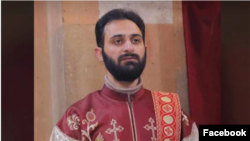Law-enforcement authorities claim that Galstanian, who led massive anti-government protests in Yerevan last year, plotted “terrorist acts” in a bid to seize power. Galstanian and 14 other persons, including Deacon Hrayr Hakobian, were arrested and indicted on June 25. Another close collaborator of the outspoken archbishop, opposition lawmaker Artur Sargsian, was prosecuted on the same charges shortly afterwards.
Courts of first instance sanctioned all of those arrests denounced by the Armenian opposition as politically motivated. The suspects’ lawyers appealed against their decisions.
A Court of Appeals judge, Vazgen Rshtuni, overturned Hakobian’s pre-trial detention late on Tuesday, ordering his immediate release. Rshtuni placed the deacon under “administrative surveillance” involving some restrictions of his political activities and freedom of movement.
The decision drew praise from opposition circles but angered pro-government politicians and other supporters of Prime Minister Nikol Pashinian. One of them, parliament deputy Arman Yeghoyan, claimed that Hakobian plotted to assassinate Pashinian and other senior officials should have therefore remained behind bars.
“In the appeal proceedings examined by me, there is no factual information regarding the issue raised by them, namely a desire to kill officials,” the judge countered in comments to the Haparak newspaper.
Armenia’s Investigative Committee said earlier that the case against Hakobian is based on a wiretapped conversation during which he allegedly said that he would not be upset if Pashinian was killed. Prosecutor-General Anna Vardapetian said this shows that the arrested archbishop and his supporters planned to assassinate Pashinian and other senior officials. None of them is facing corresponding murder charges, however.
Hakobian’s lawyer, Hovsep Sargsian, insisted on Wednesday that investigators said nothing about the alleged assassination plans and the deacon’s role in them in arrest petitions submitted to the Court of Appeals and a lower court. He claimed that the furious government reaction to Rshtuni’s decision is designed to prevent other judges from freeing the suspects.




